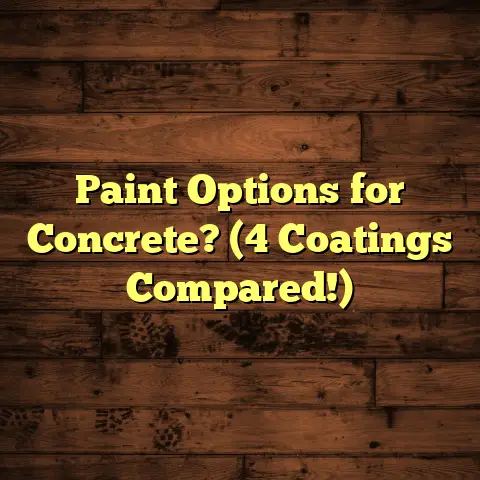How Much Epoxy Flooring Cost Philippines (Explained)
How Much Does Epoxy Flooring Cost in the Philippines? Explained
When considering flooring options for residential or commercial spaces, epoxy flooring has gained traction due to its durability, aesthetic appeal, and ease of maintenance. This article aims to provide a comprehensive overview of the costs associated with epoxy flooring installation in the Philippines, covering various factors that influence pricing, detailed cost breakdowns, comparisons with alternative flooring options, and practical advice for potential buyers.
Overview of Epoxy Flooring Costs
Epoxy flooring involves applying a resin-based coating to a concrete surface, creating a hard, glossy finish that is both attractive and durable. The costs of epoxy flooring can vary significantly based on several factors:
- Area Size: The larger the area, the greater the total cost, but per-square-meter prices may decrease with larger projects.
- Type of Epoxy: There are different types of epoxy coatings available, including solid epoxy, water-based epoxy, and 100% solids epoxy, each with its pricing structure.
- Labor Costs: Professional installation is recommended for optimal results, and labor costs can vary by region and contractor experience.
- Additional Considerations: Factors such as floor preparation (e.g., cleaning, grinding), subfloor conditions, and design complexity can influence overall costs.
Detailed Cost Breakdown
Cost Per Square Meter
In the Philippines, the cost of epoxy flooring typically ranges from ₱800 to ₱2,500 per square meter, depending on various factors:
- Basic Epoxy Coating: Approximately ₱800 to ₱1,200 per square meter.
- High-Quality Epoxy Systems: Ranges from ₱1,200 to ₱2,500 per square meter for thicker applications or decorative styles.
Factors Influencing Cost
- Area Size:
- Small Areas (up to 50 sqm): Higher per-square-meter cost due to setup and logistical considerations.
- Medium Areas (50-150 sqm): Moderate pricing with better rates compared to smaller areas.
- Large Areas (150 sqm and above): Can benefit from bulk pricing.
- Epoxy Type:
- Water-Based Epoxy: Lower cost but less durable; ideal for light-duty applications.
- Solvent-Based Epoxy: Offers better durability but at a higher price.
- 100% Solid Epoxy: Most durable option; typically the most expensive.
- Labor Costs:
- Labor charges can range from ₱300 to ₱800 per square meter, depending on the contractor’s expertise and project complexity.
- Preparation Costs:
- If significant floor preparation is needed (like concrete grinding or repairing cracks), expect an additional ₱100 to ₱300 per square meter.
Overall Project Cost Examples
| Project Size | Total Estimated Cost (₱) |
|---|---|
| 20 sqm | ₱16,000 – ₱50,000 |
| 50 sqm | ₱40,000 – ₱125,000 |
| 100 sqm | ₱80,000 – ₱250,000 |
| 200 sqm | ₱160,000 – ₱500,000 |
Comparison with Alternative Flooring Options
When comparing epoxy flooring with other popular materials like laminate, vinyl, and carpet:
- Laminate Flooring: Costs range from ₱500 to ₱1,500 per square meter. Laminate offers an affordable option but lacks the durability and moisture resistance of epoxy.
- Vinyl Flooring: Prices range from ₱600 to ₱1,200 per square meter. Vinyl is versatile and water-resistant but may not match the aesthetic appeal of epoxy.
- Carpet Flooring: Costs between ₱400 and ₱1,200 per square meter. While comfortable and warm, carpets require more maintenance and do not offer the same durability as epoxy.
Cost Comparison Summary
| Flooring Type | Price Range (₱ per sqm) | Durability | Maintenance Requirements |
|---|---|---|---|
| Epoxy | 800 – 2,500 | High | Low |
| Laminate | 500 – 1,500 | Medium | Medium |
| Vinyl | 600 – 1,200 | Medium | Low |
| Carpet | 400 – 1,200 | Low | High |
Signs Your Flooring Needs Replacement
It’s essential to recognize when your flooring may need replacing or if refinishing is sufficient:
- Surface Damage: Deep scratches or chips that cannot be repaired.
- Moisture Issues: Water damage leading to warping or mold growth.
- Fading or Discoloration: Significant changes in colour that detract from aesthetics.
- Lifting Edges: Signs of delamination or lifting may indicate deeper issues.
Refinishing vs Replacement
Refinishing is often a cost-effective alternative if the structural integrity is intact. The average cost for refinishing epoxy floors can range from ₱100 to ₱300 per square meter, depending on the extent of wear and preparation required.
Pros and Cons of Epoxy Flooring
Pros
- Durability: Highly resistant to impact and chemicals.
- Aesthetic Options: Available in various colours and finishes.
- Easy Maintenance: Requires minimal upkeep compared to other flooring options.
- Cost-Effective Over Time: Long-lasting solution that can save money in maintenance.
Cons
- Initial Cost: Higher upfront costs compared to some alternatives.
- Installation Complexity: Requires professional installation for best results.
- Temperature Sensitivity: Performance can vary with extreme temperature changes.
Professional Installation vs DIY
Cost Differences
Professional installation typically adds an extra 15% to 30% to the total project cost. While DIY installation may seem tempting to save money, it’s crucial to consider:
- Tools Required: Specialized tools for mixing and applying epoxy can be costly.
- Skill Level: Lack of experience can lead to mistakes that necessitate costly repairs.
- Time Investment: DIY projects can take significantly longer than hiring professionals.
Importance of Proper Installation
Correct installation ensures longevity and performance. Poorly applied epoxy can lead to peeling, bubbling, or uneven surfaces.
Questions to Ask Hardwood Flooring Contractors
When hiring a contractor for your epoxy flooring project, consider asking:
- What is your experience with epoxy flooring installations?
- Can you provide references from past clients?
- What is included in your quote?
- How long will the installation take?
- What type of warranty do you offer on materials and workmanship?
Care and Maintenance Tips for Epoxy Flooring
To maximise the lifespan of your epoxy floors:
- Regular Cleaning: Use a soft broom or vacuum regularly and mop with mild detergent.
- Avoid Harsh Chemicals: Stick to pH-neutral cleaners to prevent damage.
- Prompt Repairs: Address any chips or cracks immediately to avoid further damage.
- Protect High-Traffic Areas: Use rugs or mats in areas prone to heavy foot traffic.
Conclusion
Epoxy flooring presents an attractive and durable option for both residential and commercial spaces in the Philippines. While initial costs may be higher compared to alternatives like laminate or vinyl, the longevity and minimal maintenance requirements make it a worthy investment. Understanding the factors influencing costs and conducting thorough research will empower homeowners and business owners to make well-informed decisions regarding their flooring projects. Whether opting for professional installation or considering a DIY approach, ensure you weigh all options carefully for the best results.





